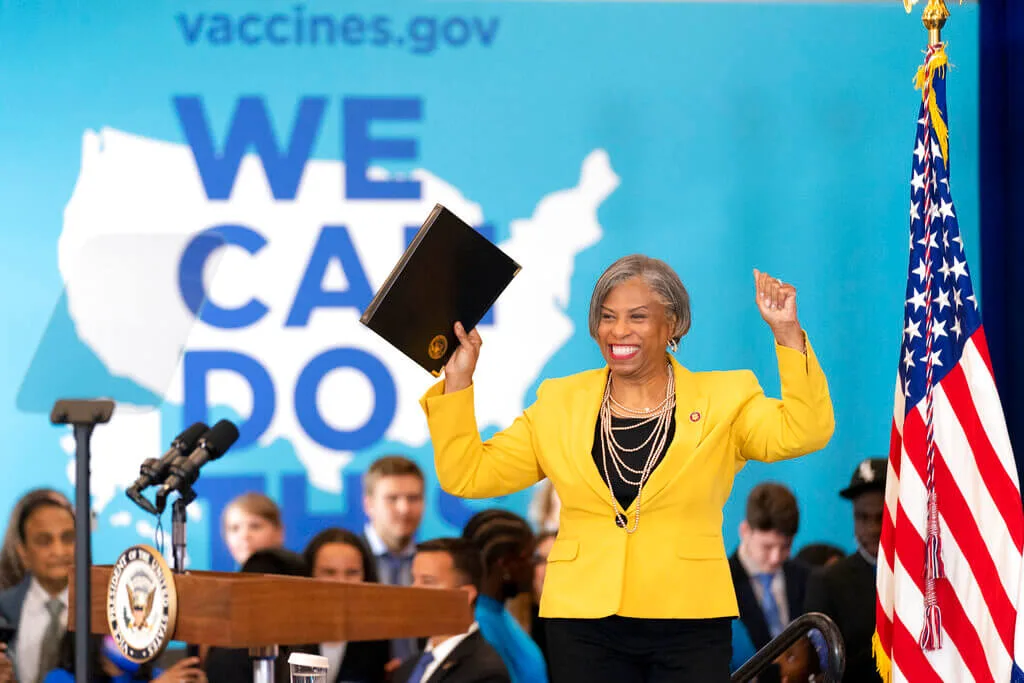
Rep. Brenda Lawrence has decided to step down at the end of her term. But her career, from working 30 years at the Postal Service to Congress, is one that won’t soon be forgotten.
Need to Know
- Rep. Brenda Lawrence isn’t running for reelection in Congress after eight years in office.
- Lawrence said she’s seen an erosion of trust across the aisle and with members of her own party.
- She’s not retiring just yet, as she’ll look for other ways to give back.
SOUTHFIELD, Mich.—Rep. Brenda Lawrence is leaving Congress on her terms—no two ways about it.
But the US Capitol building she’s leaving behind looks and feels very different from the one she was sworn into back in 2015. Then, President Barack Obama was entering his final two years in office, with the Republican-controlled legislature practicing the art of obstruction.
Still, tensions between the two sides were comparatively mellow. In Jan. 2015, the idea of a Trump presidency was a fever dream; he announced his candidacy in June of that year and ascended from polling at 3% to becoming the Republican front-runner.
The years that followed have been marked by animosity across the aisle, with significantly more name-calling and less headway on major legislative issues, Lawrence said.
“It’s sad because I see it among my colleagues that this tendency to approve of conversations of the personal attacks… which is just a waste of time and not why we were sent to Congress,” Lawrence said.
Congressional craziness has spanned attempts to bully and threaten members to a member attempting to carry a gun into session.
But all that aside, it’s not just cross-party negotiations that have soured; inside of the party, Lawrence has seen more friction too.
“There seems to be a lack of trust among my colleagues,” Lawrence said.
Lawrence’s Toughest Battle
Nothing better encapsulates the deterioration of good-faith negotiations than the recently passed infrastructure law, which made it through Congress and was signed by Biden but not without significant squabble.
As originally planned, Biden’s infrastructure and social spending initiatives were tied together. But conservatives, teaming up with Democratic Senators Joe Manchin and Kyrsten Sinema, wanted to decouple the legislation to ostensibly work on each one at a time (Spoiler alert: Manchin later shut down the Build Back Better social programs, refusing to budge and stranding funding for community colleges, childcare and more.)
Prominent progressives, like Lawrence’s Congressional neighbor, Rep. Rashida Tlaib, adamantly opposed tearing infrastructure and social spending apart, arguing that Build Back Better’s social framework was the foundation for her community.
The infrastructure bill survived rounds of back-and-forth negotiations in the Senate, eventually stripped bare of proposed funding for public housing and other sectors. Once it came to a House vote, Tlaib and a handful of other progressives, joined by a far larger contingency of Republicans, protest-voted the package no; it passed, on the back of the Democratic-controlled Senate.
The infrastructure act, signed by Biden, delivered a surge of funding to communities for roads, bridges, and rail that hadn’t been seen since the time of the New Deal. Still, Lawrence, who voted, yes, viewed it as one of the single greatest challenges—and accomplishments—of her political career.
“It was painful to go through that exercise when you know your colleagues and you believe in the same thing,” Lawrence said.
During the proceedings, Lawrence said she had a discussion with Speaker of the House Nancy Pelosi broaching the issue of trust.
“I said this to Nancy,” Lawrence said. “I said this whole thing, our discussions we’re having with our Democratic colleagues is about, do they trust us to bring forth the Build Back Better bill?”
Don’t Call It a Retirement
In January, Lawrence announced that she is not running for reelection at the end of her term in almost a year. Democrats in DC will lose a well-liked figure of leadership and champion of social issues; Michigan will lose its lone Black congressperson.
But it’s time, Lawrence tells The ‘Gander. In an interview with the Detroit Free Press following her announcement, she said she’s looking to spend more time with her family.
“It’s like reading a really, really good book, and you can’t wait to turn the page to get to the next chapter,” she said.
Retirement, however, isn’t on the cards—not in the traditional sense. Lawrence told The ‘Gander she plans to build on her career in public service that has covered the better part of five decades. She hasn’t yet announced in what capacity.
“I see public service and the level where I can teach, I can mentor,” Lawrence said. “And that’s what I’m hoping to be able to do, to advise and to use all these amazing opportunities that I have been given and give back.”
True to her degree in public administration, Lawrence felt an immediate call to give back. Following graduation, she began as a distribution clerk at the US Postal Service.
Quickly, she climbed the administrative rungs. For 30 years, she received promotions and moved toward her “dream job,” as manager of training and development. Lawrence had gotten to know a lot of people on the way up, and learned how to help others along the way.
Back home, Lawrence had taken an active stake in local politics in the 1990s. After winning the Southfield Board of Education’s presidency, she ran for city council. She won that election. Then in 2001, she became mayor, defeating a longtime incumbent and making history as the first African-American and woman to be mayor.
She continued to serve in that capacity until her election to Congress in 2015.
Lawrence’s seat in Congress no longer exists. Michigan is down to thirteen seats due to the latest Census count and a new redistricting panel saw the consolidation of several southeastern districts. A reelection bid could have positioned Lawrence for a tough showdown against more progressive wings of the party to keep representing Southfield and Detroit.
Tlaib will run for the new district. Lawrence said redistricting did not factor into her decision.
“Detroit and its surrounding communities have been blessed to be represented by notable, historic and pioneering figures in Congress — Congresswoman Brenda Lawrence will truly go down in history as one,” Tlaib said.
Reflections
As Lawrence reflects on her career, she’s grateful—to voters, mentors, and coworkers that have helped her along the way.
She’s done well. In her life, Lawrence has won 10 of the 12 elections she’s ever contested, by her count. She serves as the co-chair of the Democratic Women’s Caucus and co-chair of the Congressional Caucus on Black-Jewish Relations.
As mayor in Southfield, she built a “world-class” library for the community.
In the last year, she even was able to help pass a postal service bill that would change the model of operations for the embattled agency that has struggled financially and regularly face threats of demolition.
Stepping away will be bitter-sweet, certainly.
But she has a year left, and she isn’t done advocating for the environment, equal rights, and her community—all of which have been calling cards for Lawrence since she came to Congress.
Just in February, she introduced a new bill to propel the wireless charing of electric vehicles on US roads. Detroit is already poised to have the first technology of this kind, and recent announcements have made Michigan a hub for futuristic vehicle technology.
Her fight won’t stop there.
“I’ve had an amazing life,” Lawrence said. “The opportunity to walk the halls of Congress as a little Black girl from the Eastside of Detroit, I can tell you that I’m looking forward to this next chapter.”
Politics

Michigan Dems push for action on prescription drug board bills
BY KYLE DAVIDSON, MICHIGAN ADVANCE MICHIGAN—Four Democratic House members are renewing the call for action on prescription drug affordability,...

Local election workers fear threats to their safety as November nears. One group is trying to help.
TRAVERSE CITY—The group gathered inside the conference room, mostly women, fell silent as the audio recording began to play. The male voice, clearly...

New Biden rule protects privacy of women seeking abortions
Under the new rules, state officials and law enforcement cannot obtain medical records related to lawful reproductive health care with the goal of...
Local News

These students are protecting the ‘coral reefs’ of Michigan—and you can too
Vernal pools are a critical part of Michigan’s natural ecosystem—but they’re not protected by state regulations. Here’s how Michiganders are...

The food at Comerica Park puts peanuts & Cracker Jacks to shame
Gone are the days when peanuts and Cracker Jacks were the most exciting food items at baseball games. Baseball stadiums around the country now boast...





